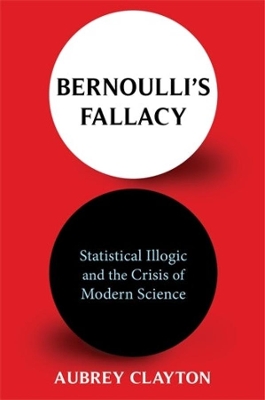Reviewed by annieb123 on
Bernoulli's Fallacy is an expository academic comparison of the statistical methods and accepted methodologies used by modern empirical scientists, analyzed and presented by Dr. Aubrey Clayton. Released 3rd Aug 2021 by Columbia University Press, it's 368 pages and is available in hardcover, audio, and ebook formats.
This is an esoteric book with urgent, potentially catastrophic, foundational implications for science (and society). The way we interpret, group, and present data has fundamental connections to what we see as "objective truth" and "facts". This is especially frightening when considered in the light of recent crises such as systemic racism, alleged election/voting fraud, and pandemic/public health methodology and data.
This is a deep dive into the subject material and will require a solid background in mathematics and statistical methodology at the very least. I have a couple degrees in engineering sciences (and a real love for bioinformatics), and it was significantly above my pay grade. I could understand much, but by no means all, of the author's exposition and there were tantalizing glimpses of deeper information which I simply couldn't grasp. Readers should expect to expend some effort here to even make an informed decision on the veracity of the author's claims.
It's an academic book, the author is an academic, and it reads very much like an academic treatise. The language isn't *quite* as impenetrable as many academic volumes. The text is well annotated throughout and the annotations will make for many hours of background reading enjoyment. I get the distinct impression that the author has made a herculean effort to use accessible language to make it more easily understood, but there is a basic level of understanding which will render it inaccessible to many readers. That being said, the author writes with style and humor and tries to make the read minimally pedantic. I can well imagine that he's a talented and popular lecturer.
At the end of the day, Disraeli wasn't wrong when he decried "lies, damned lies, and statistics". I am not strong enough in this particular field of study to say where on the above spectrum Dr. Clayton's exposition falls.
Five stars (readers should keep in mind that the subject will require significant effort). I would enthusiastically recommend that people in education and policy expend the necessary effort. It would be a good selection for public/university library acquisition, as well as for more academic settings in philosophy of mathematics and science and allied fields of study.
Disclosure: I received an ARC at no cost from the author/publisher for review purposes.
Reading updates
- Started reading
- 4 October, 2021: Finished reading
- 4 October, 2021: Reviewed
